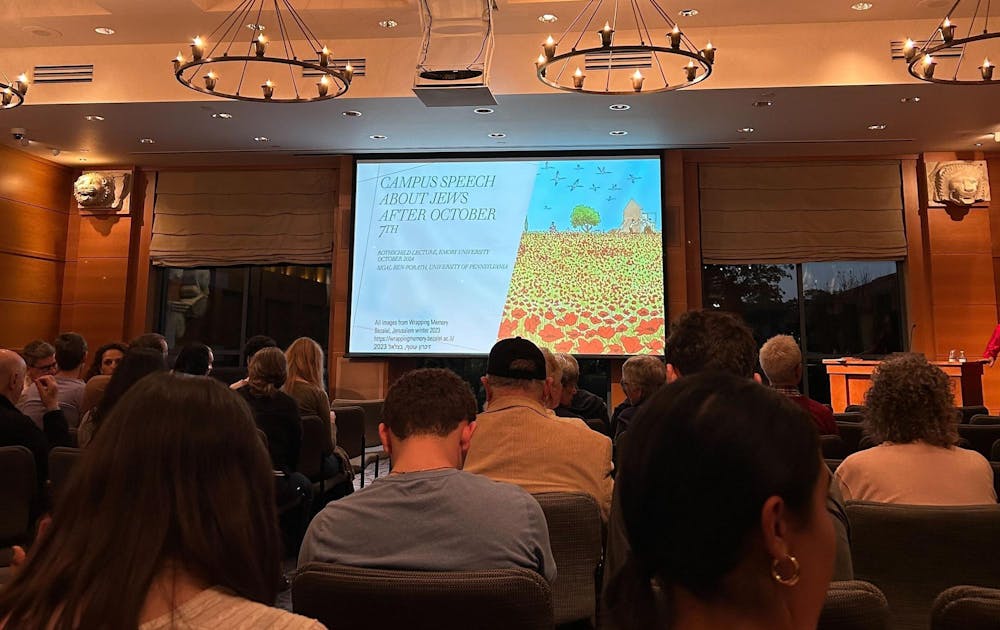University of Pennsylvania Presidential Professor of Education Sigal Ben-Porath advocated for open conversation and policy addressing antisemitism on college campuses during the Tam Institute for Jewish Studies’ annual Rabbi Jacob M. Rothschild Memorial Lecture. The Oct. 29 event drew a crowd of around 70 students, staff and community members, as well as many online viewers.
Ben-Porath recounted Hamas’ Oct. 7, 2023 attack as a development in the historic conflict and a “complete break from the world” that she had always known. According to the U.S. Department of Defense, 1,200 Israelis were killed and 251 people were taken hostage on Oct. 7, 2023. This incident was personal for Ben-Porath, as her parents were founders of Nahal Oz, a kibbutz in southern Israel that Hamas attacked.
Scrutiny of antisemitism heightened after Oct. 7, 2023, according to Ben-Porath.
“The stark acts that we have seen very soon after Oct. 7, for me, are clear breaks from how I understood my campus, some of my colleagues, some of my students and the context in which I live in Philadelphia,” Ben-Porath said.
She had not felt concerned about the perspectives of people on her campus until Hamas’ attack. During protests on the University of Pennsylvania’s campus, Ben-Porath said she was shocked by “people justifying Oct. 7” and “celebrating it as a moment of liberation for Palestinian people.” According to the Palestinian Ministry of Health, at least 43,508 Palestinians have been killed and 102,684 have been injured since Oct. 7, 2023.
Ben-Porath added that educational institutions may spread antisemitic rhetoric in disciplines like anthropology and sociology, whether unintentionally through historical bias or by an authority’s decision.
“In some disciplines and professions, you can come in not knowing anything about Jews and come out harboring antisemitic perceptions,” Ben-Porath said.
However, Ben-Porath said simply educating students about antisemitism is not enough if the environment surrounding this learning does not endorse policies that counter antisemitism.
Ben-Porath cited a recent study from Dartmouth College (N.H.) that shows that increased education only correlates with a reduction in antisemitism when countries implement measures, laws and policies that reduce antisemitism.
“Being more educated does not make you less bigoted in this particular regard,” Ben-Porath said.
While many students are aware of the antisemitism on their campuses, Ben-Porath suggested that the lack of urgency given to developing an effective policy to address the issue is preventing progress toward a safer campus atmosphere.
Ben-Porath referenced the widespread professional and educational efforts made toward anti-racism after George Floyd’s death in 2020 as an effective response to institutional bigotry, suggesting similar action should be taken against antisemitism.
“That was an effort to try and review, ‘Are we in some way propagating or inadvertently strengthening somebody's misguided, biased or racist views?’” Ben-Porath said. “‘What can we do to correct what we are teaching people within our school community that by omission or by inclusion reflects racially biased perspectives?’ We need to do similar things in regards to content related to Jews.”
Ben-Porath’s event drew the attention of professors and students alike. Associate Professor of Spanish Hazel Gold said she enjoyed Ben-Porath’s lecture and found it to be reflective of her classroom’s environment.
“We are all coming together for the same reason, trusting each other to air different views, but in a forum that promotes both the learning, finding truth, seeking new knowledge, but also the democratic role that we have in higher ed,” Gold said.
Alard Nguyen (26C) said he was intrigued by the lecture’s title after taking a class on the Israel-Palestine conflict and hoped to gain a valuable perspective from “a renowned Jewish scholar.” Nguyen added that events like Ben-Porath’s lecture create space for positive growth on campus, especially for non-Jewish students.
“It’s a good perspective to hear about and reflect on our actions,” Nguyen said. “People who aren’t Jewish, what should we understand about their perspective?”
Gold said she is especially impressed by the potential that her young students hold and believes that lectures like Ben-Porath’s can positively influence how they learn to participate in meaningful dialogue.
Ben-Porath finished the lecture by stating the important role that higher education plays in creating an environment of trust and progress for young people.
“What we need is to figure out a way to create a network of trust that is ever-expanding,” Ben-Porath said.
Correction (11/16/2024 at 3:04 p.m.): A previous version of this article incorrectly stated University of Pennsylvania Presidential Professor of Education Sigal Ben-Porath as Rabbi Sigal Ben-Porath. In fact, Ben-Porath is not a rabbi.








